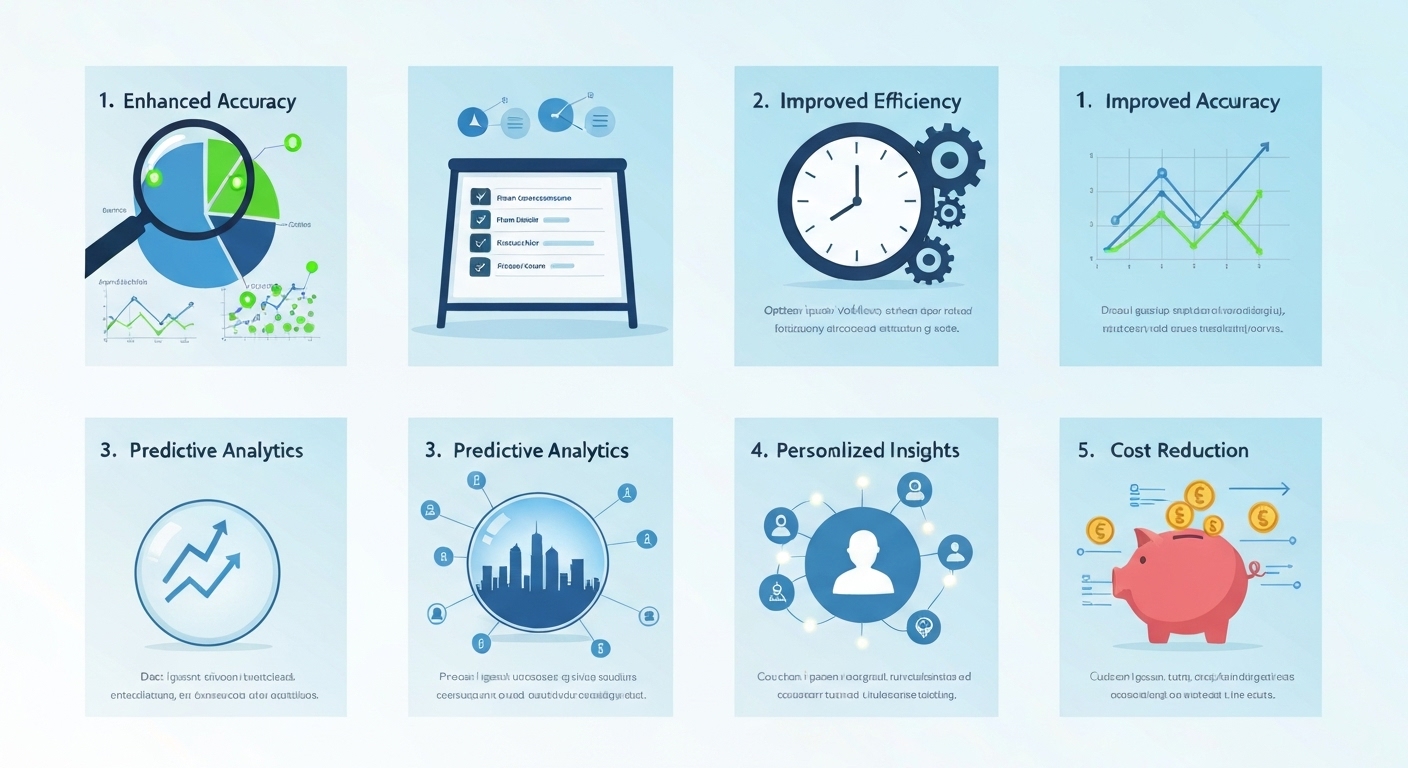AI – Driven Decision Making for Businesses : A Comprehensive Guide
AI-driven decision making for businesses is revolutionizing how companies operate and compete. By leveraging the power of artificial intelligence, businesses can make faster, more informed decisions, leading to improved efficiency, increased profitability, and a stronger competitive advantage.
Understanding AI in Business Decision Making
Artificial intelligence (AI) encompasses a range of technologies that enable computers to perform tasks that typically require human intelligence. In the context of business, AI can be used to analyze vast amounts of data, identify patterns, and generate insights that can inform strategic and operational decisions. This goes beyond traditional business intelligence by adding layers of predictive and prescriptive analytics.

The Evolution of Decision Support Systems
Traditionally, businesses have relied on human intuition and experience, coupled with basic data analysis, to make decisions. However, the increasing volume and complexity of data have made it challenging for humans to process information effectively. AI-driven decision support systems augment human capabilities, allowing businesses to make more data-driven choices.
Benefits of AI-Driven Decision Making
Implementing AI into decision-making processes offers numerous advantages for businesses of all sizes.
- Improved Accuracy: AI algorithms can identify patterns and anomalies in data that humans might miss, leading to more accurate predictions and better decisions.
- Increased Efficiency: AI can automate repetitive tasks and streamline decision-making processes, freeing up human employees to focus on more strategic initiatives.
- Reduced Costs: By optimizing processes and minimizing errors, AI can help businesses reduce costs and improve profitability.
- Enhanced Customer Experience: AI can be used to personalize customer interactions and provide tailored recommendations, leading to improved customer satisfaction and loyalty.
- Competitive Advantage: Businesses that embrace AI-driven decision making can gain a significant competitive advantage over those that rely on traditional methods.

Predictive Analytics: Forecasting the Future
Predictive analytics, a core component of AI-driven decision making, uses statistical techniques and machine learning algorithms to forecast future outcomes based on historical data. This allows businesses to anticipate market trends, identify potential risks, and make proactive decisions to mitigate challenges and capitalize on opportunities. Using techniques like time series analysis and regression helps improve forecasts.
Implementing AI in Your Business: A Step-by-Step Guide
Implementing AI-driven decision making requires careful planning and execution. Here’s a step-by-step guide to help you get started:
- Identify Business Needs: Determine which areas of your business can benefit most from AI-driven decision making.
- Gather and Prepare Data: Collect and clean the data that will be used to train the AI algorithms. Ensure data quality and relevance.
- Choose the Right AI Tools: Select the AI tools and platforms that are best suited for your specific needs.
- Develop AI Models: Build and train AI models using the prepared data. Consider using machine learning algorithms.
- Integrate AI into Workflows: Integrate the AI models into your existing business workflows and processes.
- Monitor and Evaluate: Continuously monitor and evaluate the performance of the AI models and make adjustments as needed.
Choosing the Right AI Solutions
Selecting the appropriate AI solutions is crucial for successful implementation. Consider factors such as cost, scalability, ease of use, and integration capabilities when evaluating different options. Open-source libraries like TensorFlow and PyTorch offer powerful tools, while cloud-based AI platforms provide scalable infrastructure.

Real-World Examples of AI-Driven Decision Making
Numerous companies across various industries are already leveraging AI-driven decision making to achieve significant results. Here are a few examples:
- Retail: Retailers use AI to personalize product recommendations, optimize pricing strategies, and manage inventory levels.
- Finance: Financial institutions use AI to detect fraud, assess credit risk, and provide personalized financial advice.
- Healthcare: Healthcare providers use AI to diagnose diseases, personalize treatment plans, and improve patient outcomes.
- Manufacturing: Manufacturers use AI to optimize production processes, predict equipment failures, and improve quality control.
AI in Supply Chain Management
AI is transforming supply chain management by optimizing logistics, predicting demand, and mitigating disruptions. Machine learning algorithms can analyze historical data to forecast demand accurately, allowing businesses to optimize inventory levels and reduce waste. AI can also be used to monitor real-time supply chain conditions and identify potential risks, such as weather events or transportation delays. To learn more about these technologies, check out commerce.gov. Furthermore, flashs.cloud offers additional resources on AI implementation.
Overcoming Challenges in AI Implementation
While AI-driven decision making offers numerous benefits, there are also challenges to overcome. These include:
- Data Quality: AI algorithms are only as good as the data they are trained on. Poor data quality can lead to inaccurate predictions and poor decisions.
- Lack of Expertise: Implementing AI requires specialized skills and expertise. Businesses may need to hire data scientists or partner with AI consulting firms.
- Ethical Considerations: AI raises ethical concerns related to bias, privacy, and transparency. Businesses need to ensure that their AI systems are fair, unbiased, and transparent.
- Integration Complexity: Integrating AI into existing business systems can be complex and challenging.
Addressing Data Privacy Concerns
Data privacy is a paramount concern when implementing AI-driven decision making. Businesses must comply with data privacy regulations, such as GDPR and CCPA, and implement robust security measures to protect sensitive data. Anonymization and pseudonymization techniques can help mitigate privacy risks. Educating employees about data privacy best practices is also essential.

The Future of AI-Driven Decision Making
The future of AI-driven decision making is bright. As AI technology continues to evolve, it will become even more powerful and accessible, enabling businesses to make even more informed and effective decisions. The convergence of AI with other technologies, such as cloud computing and IoT, will further accelerate the adoption of AI-driven decision making across industries. As more data becomes available and AI models become more sophisticated, the potential applications of AI in business are virtually limitless.
AI and Business Automation
AI is driving business automation by automating repetitive tasks and streamlining workflows. Robotic process automation (RPA), powered by AI, can automate tasks such as data entry, invoice processing, and customer service inquiries. This frees up human employees to focus on more strategic and creative tasks, increasing productivity and reducing costs. Automation can also improve accuracy and consistency, leading to better outcomes.
Conclusion
AI-driven decision making for businesses is no longer a futuristic concept; it is a present-day reality. By embracing AI, businesses can unlock new levels of efficiency, productivity, and profitability. While challenges exist, the potential benefits of AI-driven decision making are too significant to ignore. As AI technology continues to advance, businesses that embrace AI will be well-positioned to thrive in the ever-evolving global marketplace. The key is to start small, focus on specific business needs, and continuously learn and adapt as AI technology evolves. The adoption of artificial intelligence in business is not merely an option, but an imperative for survival and success.
HOTLINE
+84372 005 899


